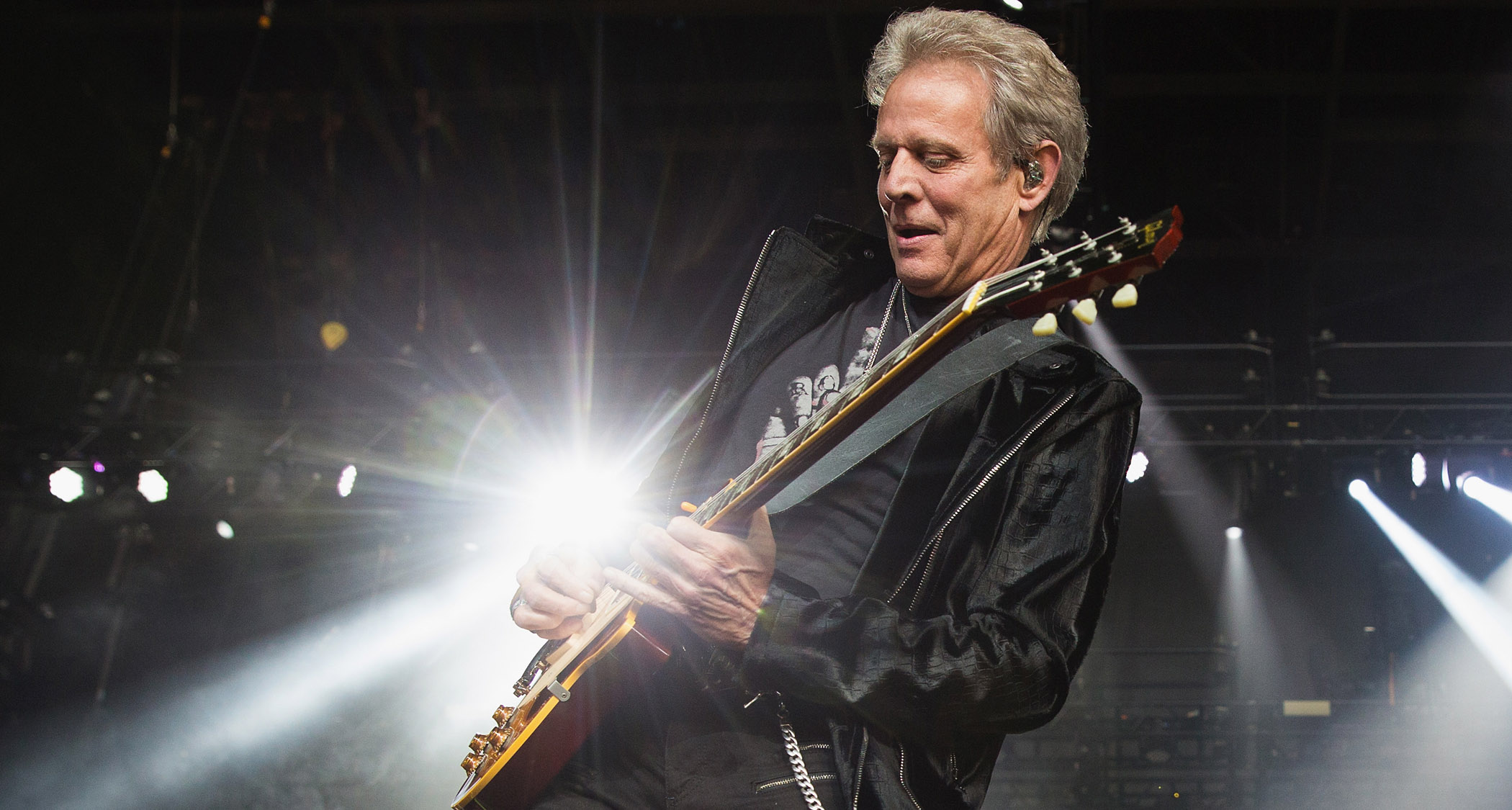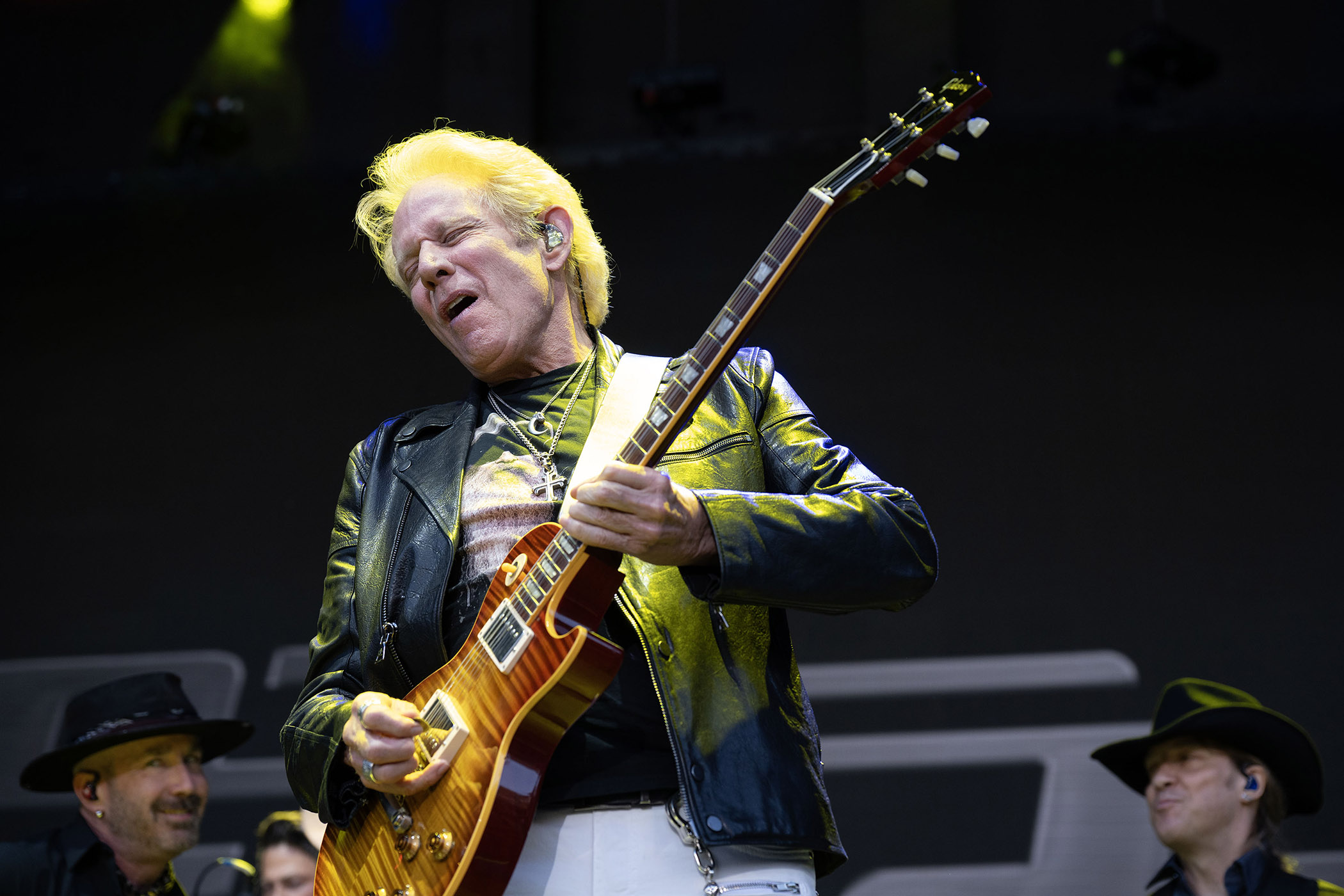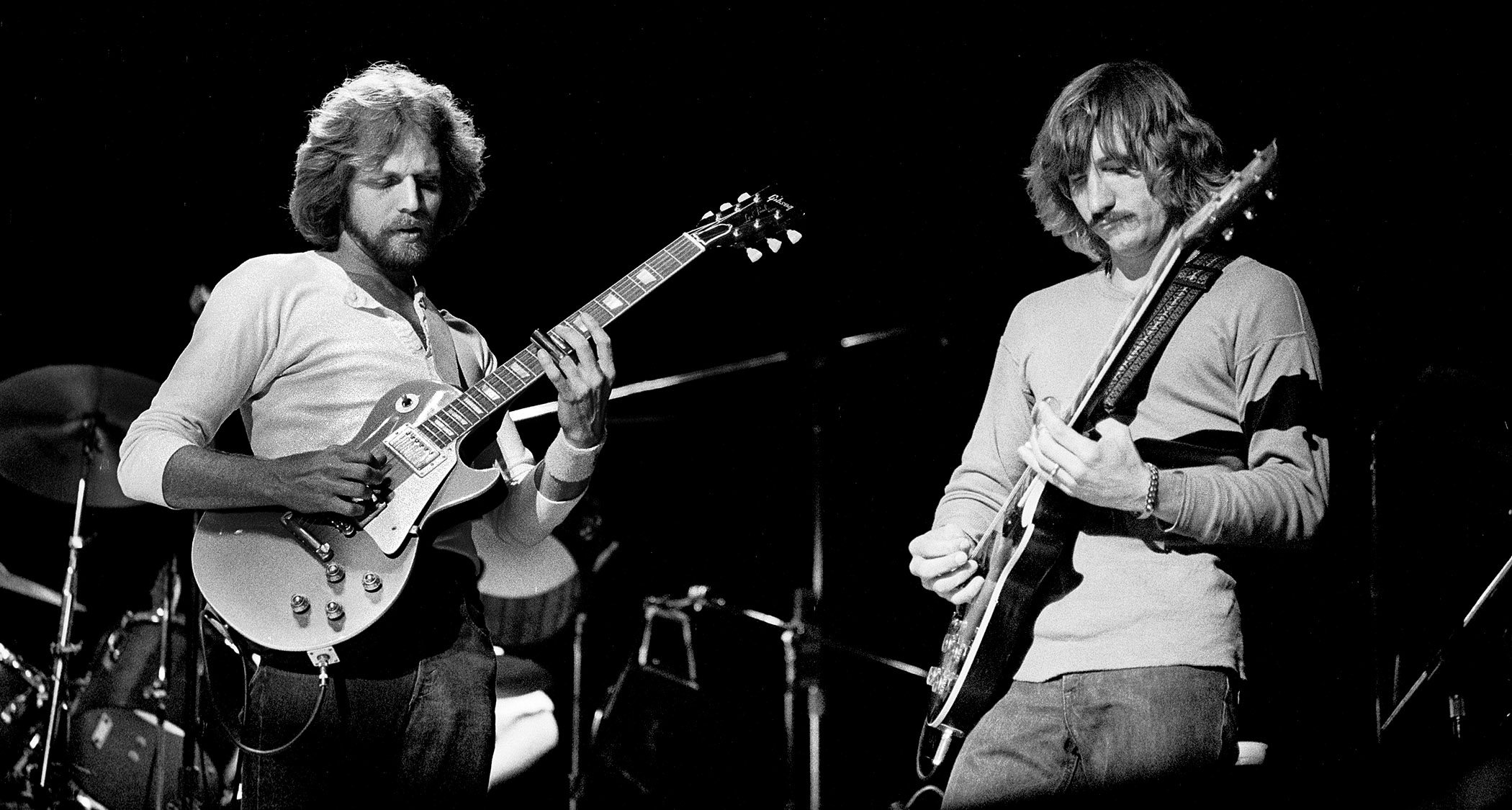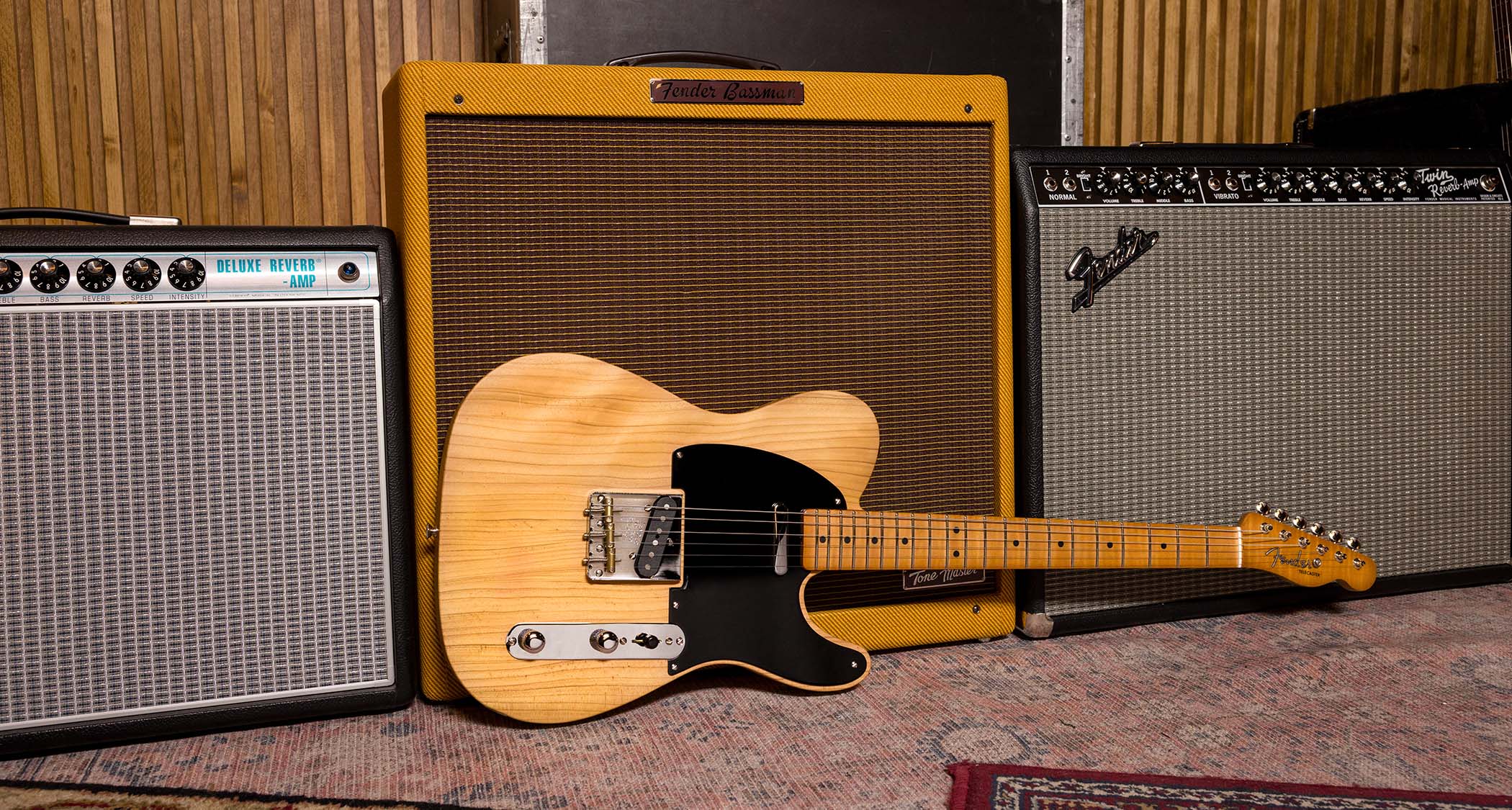“I opened the case and Glenn went, ‘Wow. What’d you pay for that?’ I went '$1,200...’ He said, ‘Cheap!’ in a very derogatory way – so I called my ’59 ‘the cheap Les Paul’”: Don Felder on medical emergencies, Eagles sessions and his million dollar ’Burst
With The Vault – Fifty Years Of Music, the ex-Eagles guitarist marks a career milestone by bringing lost demos to life and re-recording the classic Heavy Metal. And he isn't stopping any time soon

Don Felder is 77 and in February of 2025 he had a health scare, collapsing on stage due to dehydration. You’d think he’d be mulling the idea of slowing down, but when Felder talks about his career, there’s an urgency to his voice. “I’ve got to work and produce as much as I possibly can while I’m still in good health, and still happy and inspired by it.”
To that end, Felder is holding up his end of the bargain, releasing The Vault – Fifty Years Of Music earlier this year. The album is a collection of old, new and reworked material. “I walk into my studio with it being totally dark, [thinking], ‘I have no idea in the world what I’m going to do,’” Felder tells Guitarist.
His approach seems a bit whimsical, if not entirely romantic. But given his prowess – which has produced classic solos on songs like the Eagles’ One Of These Nights, Hotel California and his beloved cut on Heavy Metal – who can argue?
But that’s not to say that Felder isn’t without a plan. In fact, he’s downright techy: “I open up Pro Tools and I’ve got everything set up,” he says. “Then I grab an electric guitar and see what comes out.”
Though many of Felder’s iconic solos present as pre-composed, it’s his underrated improvisational nature that guides his playing. “I love walking into my studio and going, ‘Let’s try this….’ The worst thing that can happen is it goes to digital heaven. But I don’t erase anything, to tell you the truth.”
Felder’s solo career is booming, with his live shows well attended, but there’s no denying his association with the Eagles, a band he left under difficult circumstances in the early 2000s. Nevertheless, the veteran guitarist is past all that and keeps a cheery outlook bred through the Malibu sunshine he finds himself in while off the road. And unlike the Eagles, who are currently playing out a residency at Las Vegas’s Sphere following the ‘Long Goodbye’ tour, Felder isn’t hanging up his six‑string anytime soon.
“It’s a great life,” Felder says. “I’ve been blessed with the opportunity to do this. I’m still in good health and writing and recording good stuff, so I’m going to keep doing it. My philosophy is: I’m going to rock till I drop.”
All the latest guitar news, interviews, lessons, reviews, deals and more, direct to your inbox!
I didn’t realise what dehydration is, or what it could do to you. When it hit me in the middle of the set on that cruise ship, I had no idea what was going on
You had a health scare mid-performance earlier this year. How are you feeling now?
“I’m feeling fantastic. I didn’t realise what dehydration is, or what it could do to you. When it hit me in the middle of the set on that cruise ship, I had no idea what was going on. It was like somebody reached over, took the light dimmer and just slowly dimmed it down to zero.
“I was holding onto the microphone stand just to keep myself from collapsing when Jaden [Osborne], my girlfriend, who was on the side of the stage, recognised it immediately and came over to help me get off the stage.
“Ironically, there happened to be a paramedic in the crowd from Gainesville, Florida, of all places – where I come from – who came backstage and took me down to the medical place.
“They gave me an IV and 30 minutes later I was back, saying, ‘Let’s go finish the set.’ But they said, ‘No, everybody left,’ so I took the rest of the day, and the next day I continued the show. But I didn’t realise how important it was to stay hydrated, especially at sea.
“I don’t drink alcohol or do any drugs, so I couldn’t figure out what the hell it was. But it was just a total matter of not drinking enough electrolytes. So I’m back to 100 per cent.”
You have a new record, The Vault – Fifty Years Of Music. What’s the story there?
“I lived in Malibu for 29 years and after the fifth major forest fire running through, though I’d never lost a home, I was at the point where I was tired of the roads closing and the mud slides from the rain. I said, ‘I’m just going to move into town.’ So I packed my studio up and carted it into town, and in 2000 we put it all in a storage unit.
“I hadn’t seen anything in that storage unit for over 20 years, and about four or five years ago I took a look and found a huge box of four-tracks, cassettes and CDs. I thought, ‘I don’t even know what this stuff is…’ but as I played them, I kept hearing some of these ideas, which were great. They were just thumbnail sketches of song ideas, so I took those and finished them – and also wrote two new songs.”
You’ve got a reworked version of Heavy Metal on the record. What led to that?
“After listening to it since 1981 or ’82, just the tonality and the quality of it sounded kind of dated, you know? I thought, ‘I really like that song. I love playing it, and I play it at almost every one of my live shows. I just want to do a fresh version of it.’ I used 96k Pro Tools and with the remastering that we have today you can make things sound really great. So I went back and re-recorded it. It was fun to do and it just sounds a lot better to me.”
Is it true that Heavy Metal was a song that started with the Eagles but found life after you broke out the solo?
“It was going to be a follow-up on The Long Run to Hotel California. It had a real kind of heavy hand to it and I wrote it so that Joe [Walsh] and I could play even harder than we did, or edgier than we did on Hotel, against each other. It had harmony parts, trading-off solos and a much harder rock edge.
“We went in and recorded the basic track for The Long Run but never got around to finishing the lyrics. So we had a basic track, but it just died in the Eagles’ vault until I got a call years later about doing a song for the Heavy Metal movie [released in 1981].
“Without the title Heavy Metal, that song could have, and should have, in my opinion, been finished on an Eagles record with Joe and I following up on Hotel with some dazzling guitar solos and stuff. It didn’t happen, we just didn’t have time.
“We had a tour booked and planned, and we were just dying to get through this record [The Long Run], the final mixes, cleaning up vocals, mastering, artwork. We just didn’t have time to do everything we needed to do. There were a lot of dropped ideas along the way, but I took the idea and turned it into Heavy Metal.”
How about the opening track, Moving On, which dates to 1974 when you first joined the Eagles?
“It was the first demo I wrote for the Eagles as a contender for a song that might wind up on an album. Bernie Leadon, my high school friend and [Eagles] bandmate told me, ‘If you want to write songs for the Eagles, don’t write lyrics, only write music, like a song structure.’
Bernie Leadon, my high school friend and bandmate told me, ‘If you want to write songs for the Eagles, don’t write lyrics, only write music, like a song structure’
“So it was like intro, first verse, second verse, chorus, third verse, chorus, solo, chorus, chorus, chorus, outro, right? Every time I would write song ideas, I wrote them with no lyrics, no vocals, no nothing. Don Henley loved that song, it was just that we had no time to actually do a basic track of it.
“We were interested in finishing an album, getting it out and getting back on the road, doing promotion and live shows. That song literally sat in that cardboard box since 1974, I guess, until I pulled it out, and said, ‘What is this?’ I listened to it, and went, ‘Oh, yeah, I remember this… this was a great idea.’ That’s how I breathed new life into some great old ideas.”
On the subject of the Eagles, people often talk about your Hotel California solo, but you had a lot of improvisational moments with the band, too.
“I guess my most famous improvisation was the introduction on the acoustic version of Hotel California for Hell Freezes Over [1994]. We had worked it out at rehearsal, and Henley said we needed an acoustic version because everybody was doing the unplugged thing back in the mid-90s.”
It seems precarious to alter such an iconic song, especially given the reunion nature of Hell Freezes Over.
I’m sitting on stage, there are about nine to 10 cameras, and an orchestra behind us all sitting there waiting for me to make up the introduction of Hotel California…
“I worked up an arrangement where I didn’t use steel-stringed acoustic guitars because we’d have sounded like a bunch of flat-top country pickers [laughs]. I have pretty good acoustic chops on nylon-string guitar, so when we went and got on stage, we were ready to do the soundcheck, Henley says, ‘Hotel needs a special introduction.’ I said, ‘Well, what are you going to say? Are you going to talk about how it came about or what it means?’
“Henley said, ‘No, no, it needs a musical introduction. Make up something.’ So I’m sitting on stage, there are about nine to 10 cameras, and an orchestra behind us all sitting there waiting for me to make up the introduction of Hotel California…
“I said, ‘Well, okay, you guys play a chord and I’ll diddle with this chord and then I’ll diddle some more.’ I played a chord, diddled all the way up to the end of it, and when I hit the last note, I said, ‘I want you guys to strum the last chord and then we’ll start percussion.’
“We did that, made two takes of it – because we did two shows in the same outfits and clothes so we’d have a lot of footage – and when we got to the studio, we listened to it and that one was the one, the first one was what wound up on the record. A lot of times, my first shot from the hip is the best thing that I’ve got.”

Your acoustic work on The Sad Café from The Long Run seems to have an improvisational quality to it. Was that the case?
“The ability to just make something up on the spot and being able to improvise has just been a wonderful thing for me to explore. But when we were doing The Sad Café, I’d been playing acoustic on it and Don said, ‘Why don’t you do a guitar solo here?’
“I said, ‘Well, I can’t do an electric guitar solo in the middle of that song. Let me come up with something that’s an acoustic solo.’ It was the first time I had multi-track harmony acoustic guitars playing a solo. It was just something new, different. I said, ‘Let’s try this…’”
Given that your fans expect you to play a lot of well‑loved Eagles material live, are you able to improvise as much as you’d like?
“When I walk out on stage, I have to play a lot of things that I recorded and wrote with the Eagles and co-wrote with those guys. I have to play it pretty much verbatim. I can’t go out and jam on the end of Hotel California; people will go, ‘What is he doing? That’s not like the record!’ So I’ve got to play stuff like people have heard it for the last 40 or 50 years. To be able to open my creativity in my studio is really a blessing and I love doing it.”

We’ve heard a lot about your Gibson Custom Shop guitars in recent years, but what else are you using these days?
“I have a little over 300 guitars and just about every name, brand and model you can think of. I met Leo Fender out in Corona at the Custom Shop when he was still alive, and I’d go out there, grab four or five necks out of the trash can and they’d give me unfinished bodies.
“If I wanted to have pickups, I’d go up and see Seymour Duncan, my buddy, and we’d wrap some pickups up there, which I still do.
“So I’d build these Strats – I’ve probably got six or eight Stratocasters that I just built out of parts that are in my locker. That, to me, is really kind of fun because I’m building things that are totally different from what you’ve ever seen, heard or used in the past. It’s a different-sounding Strat. I love experimenting with just building stuff.”

Do you have one guitar to rule them all, so to speak?
“My original ’59 Les Paul that I spent $1,200 on. When I bought it, I got it from a guy named Tony Dukes in Texas. Every time [the Eagles] came through Texas, he would show up with either a station wagon or a pickup truck full of old Telecasters, Stratocasters, Les Pauls – you name it. And we’d buy everything he had.
“I bought that Les Paul for $1,200, brought it to soundcheck, opened the case and Glenn [Frey] went, ‘Wow, that’s really nice. What’d you pay for that?’ I went, ‘1,200 bucks…’ Now, that was a lot of money then and so Glenn said, ‘Cheap!’ in a very kind of derogatory way. So I have always called my ’59 Les Paul ‘the cheap Les Paul’. But now, today, it’s probably worth well over a million bucks, if not more. I think it was a good investment at the time [laughs].”
How do you view your solo career versus your work with the Eagles?
Looking back, the Eagles were a very controlled environment. We were all trying to do the absolute best that we could do, from writing lyrics, vocal tracks, guitar parts – everything
“Looking back, the Eagles were a very controlled environment. We were all trying to do the absolute best that we could do, from writing lyrics, vocal tracks, guitar parts – everything. And whoever was the one who came up with the strongest idea and had the greatest energy in a certain direction, that’s what we followed.
“But it wasn’t like I could walk in and say, ‘Hey, I’ve got this rough idea for a song here,’ and I’d start playing a groove and have everybody just jump on it. It didn’t work quite that way. A lot of what happened was under a kind of group control, if you know what I mean.”
What does the future look like for you in terms of live performances and new music?
“The future looks really bright. I love touring, despite the fact that when you tour, you spend more time every day tracking than you do actually playing music. That’s why when I’m going from A to B, I always break out a laptop and start writing down song ideas.
“I hate to have that time just evaporate and not be productive. I got to the point where there’s nothing else I would rather do, and there’s nothing more fulfilling, exciting and that I’m more passionate about in life than writing, recording and touring.”
- The Vault – Fifty Years Of Music is out now via Frontiers
Andrew Daly is an iced-coffee-addicted, oddball Telecaster-playing, alfredo pasta-loving journalist from Long Island, NY, who, in addition to being a contributing writer for Guitar World, scribes for Bass Player, Guitar Player, Guitarist, and MusicRadar. Andrew has interviewed favorites like Ace Frehley, Johnny Marr, Vito Bratta, Bruce Kulick, Joe Perry, Brad Whitford, Tom Morello, Rich Robinson, and Paul Stanley, while his all-time favorite (rhythm player), Keith Richards, continues to elude him.
You must confirm your public display name before commenting
Please logout and then login again, you will then be prompted to enter your display name.






